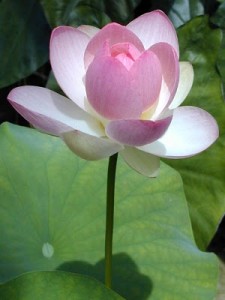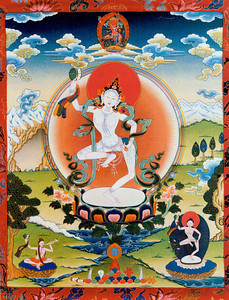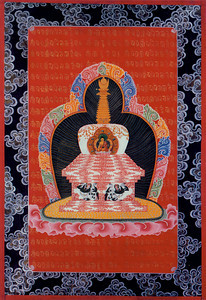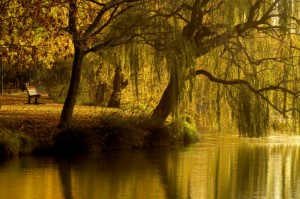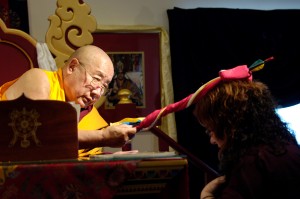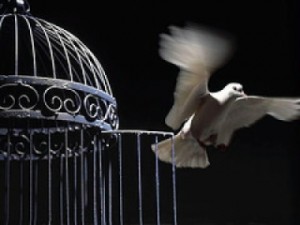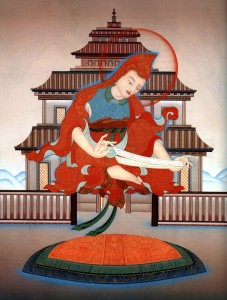
The following is an excerpt from a teaching by Jetsunma Ahkon Lhamo called “Your Treasure is Heart”
Bodhicitta is the one subject that is taught from the first moment that one enters onto the path until the last moment before one really engages in completion stage practice. It is a primary and necessary fundamental foundational meditation, an absorption that one should remain in from the first moment upon hearing the Dharma to the last moment before one actually enters into nirvana. There should never be a moment when the the idea of Bodhicitta is not part of your life and part of your heart.
So what is Bodhicitta? Bodhicitta means the “great awakening,” and it has to do with the awakening mind. The Bodhisattva, one who is engaged in the practice of Bodhicitta, is one who is an awakening being. The Bodhisattvas take a vow by which they do not actually go into Buddhahood. They move further and further along what are called the bhumis, or steps, further and further into this precious state of awakening. Upon taking the Bodhisattva Vow, remaining fully absorbed in that vow, and beginning to accomplish that vow, one then begins to enter the first bhumi which is a very major step, a very major accomplishment. Then from the first bhumi one goes to the second, third, fourth, fifth, and so on, and at the tenth bhumi one is then able to step very easily into full Buddhahood. However, the Bodhisattva who is on the tenth bhumi holds back and does not take that final step in order to remain in the world for the sake of sentient beings: appearing in a form that is of benefit to sentient beings, and being able to teach and guide them.
So we are practicing and studying this Bodhicitta which is so precious and so important. Many of the religions in the world have the idea of compassion. That idea of compassion is stated in various ways, but in the Buddhadharma, it is not only one of the teachings, it is considered to be one of the two main legs of the path of the Buddhadharma. There is the wisdom and the Bodhicitta, wisdom and compassion. So these are the two legs of the path. It is considered that if one cannot accomplish compassion, if one cannot accomplish the Bodhicitta, then whatever else one is doing on the path amounts to very little. Bodhicitta is the cornerstone, the key. It is the essence of development. The Bodhicitta is the practice of compassion, when it is seen in a relative environment, such as this earth, filled with materialistic view and material phenomena. In this world of duality and relativity, when we think of Bodhicitta, we think of it as a practice in order to attain. But actually in truth, Bodhicitta is the very display or essence, the nature of the ground of our being.
Buddha is not just a historical man that lived a long time ago. Buddhas are not just the little statues, some of them fat little guys and some of them fancy guys. Buddha is our nature and can be considered the primordial ground of being. It is that essence, suchness, which is very difficult to describe. In fact, once one describes the nature of Buddhahood, then one has actually left the nature of Buddhahood. It cannot be described in such a way that one remains stable in the view of Buddhahood because once conceptualization and discrimination actually occur, then the meaning of Buddhahood is changed. So, ultimately, Buddhahood can only be understood in one’s meditation practice.
The closest we can come is to describe Buddhahood as being the fundamental ground of being. It is neither empty nor full. It is both and it is neither. It is neither silent nor filled with sound. It is both and it is neither. It is neither form nor formless. It is both, and yet neither. Buddhahood is that ultimate mystery that cannot be described in terminology that we understand because our terminology requires duality. It requires us to separate ourselves from that which we describe as though we were an audience. It requires us to discriminate and conceptualize. Discrimination and conceptualization are not in accordance with a true view of Buddhahood, because when one realizes and gives rise to that precious awakened state called Buddhahood, one cannot detect any separation. One cannot determine definition. One cannot judge where one thing ends and another thing begins. If we were to view from the fully awakened state that the Buddha was in when he described himself as being awake, we would not be able to determine where one being ended and another being began. That whole concept would be lost in the state of Buddhahood.
We think of Bodhicitta as the practice of compassion that we should attain to. We only have that idea because we are in a fundamentally deluded state, in a separated state, believing that self and other are in fact separate, believing that relative view and the view of Buddhahood are somehow separate. So that’s how we view Bodhicitta, as some thing that we do, some thing that we practice, but in fact the Bodhicitta is the very breath, or first movement or display or dance of the Buddha nature. If the Buddha nature is like the sun, radiant in every conceivable way, then the Bodhicitta can be considered like the rays of the sun. The rays of the sun cannot occur without the sun in the same way that Bodhicitta cannot occur without Buddhahood. In the same way, the sun does not occur without its rays; therefore Buddhahood does not occur without Bodhicitta. These two are inseparable. They cannot be determined as separate in any way, shape, manner or form other than through the dialogue of confusion, which is how we talk—language based on separation and delusion.
Copyright © Jetsunma Ahkon Lhamo. All rights reserved
